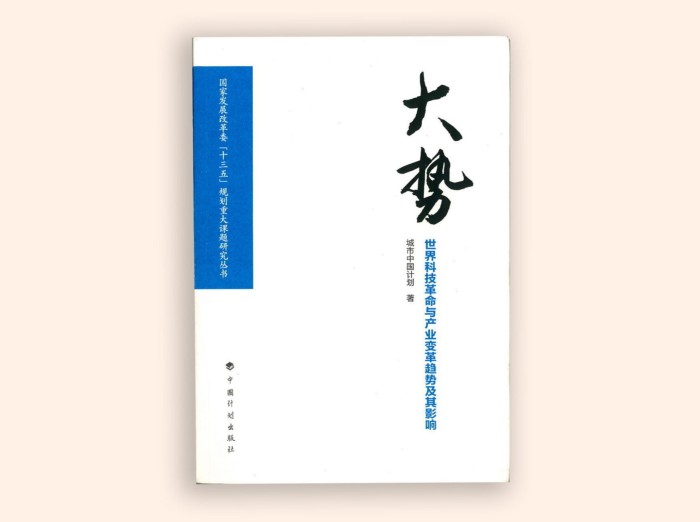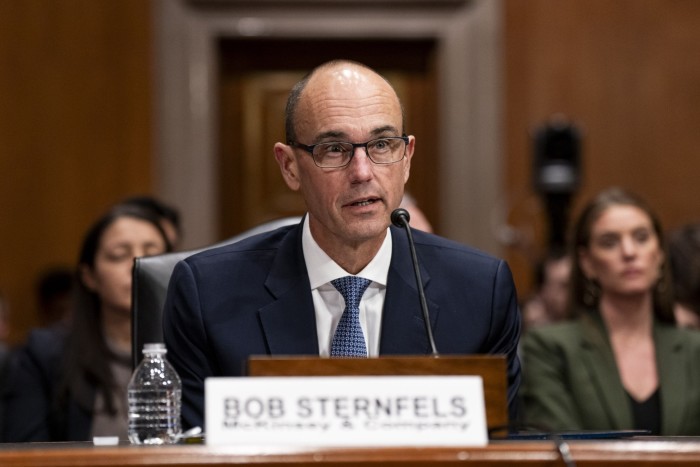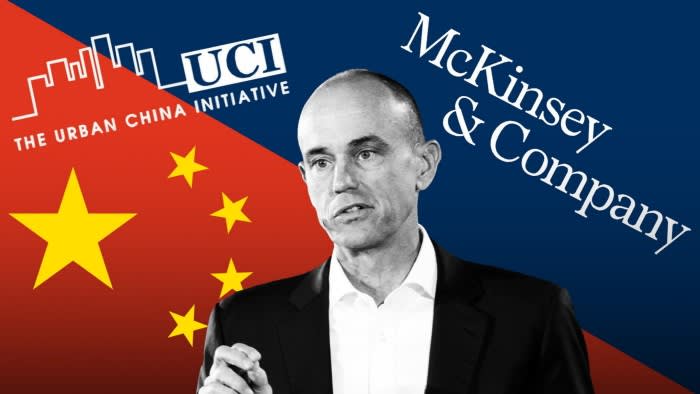A McKinsey-led think-tank advised China to deepen co-operation between business and the military and push foreign companies out of sensitive industries as part of a project for the central government in 2015.
The recommendations in a book by the Urban China Initiative, commissioned by the Chinese government’s central planning agency, were among dozens of policies it proposed to boost the country’s technological prowess, according to a review of the work, which has not previously been reported in western media.
The UCI’s book — with a foreword by one of McKinsey’s most senior partners in China and drawing on work by McKinsey’s in-house research arm — formed part of the Chinese government’s research for its 13th Five-Year Plan covering 2016-20. The Five-Year Plan included the “Made in China 2025” policy that increased tensions between Beijing and Washington.
McKinsey shut down UCI in 2021 and has played down its relationship with the Chinese government since coming under political pressure in the US, where lawmakers have questioned if consulting in China conflicts with the firm’s work for the US Department of Defense.
At a congressional hearing this month, Bob Sternfels, McKinsey’s global managing partner, said: “We do no work, and to the best of my knowledge never have, for the Chinese Communist party or for the central government in China. The vast majority of work that we do in China is for multinational companies. Many of those are US companies and private sector Chinese companies.”
McKinsey said the 2015 project for the Chinese government’s National Development and Reform Commission “was not authored by McKinsey and is not McKinsey work” and it stands by its statements regarding its work in the country.
“The Urban China Initiative was a non-profit initiative co-founded in 2011 with Columbia University and Tsinghua University. The Urban China Initiative is not McKinsey, and it did not perform work on McKinsey’s behalf. To our knowledge, McKinsey was not compensated for any UCI-related research or initiatives,” it said, adding: “As we have stated previously, the central government of China is not, and to our knowledge has never been, a client of McKinsey.”
McKinsey founded UCI with its university partners in 2011 in a different geopolitical climate, describing the initiative as a “convener of China’s leading national, provincial and local dialogues on urban issues”. Activities included publishing a sustainable cities index to “help urban leaders make informed policy decisions” and holding regular conferences that afforded McKinsey access to officials at multiple levels of government.
UCI has been described by several people involved as a McKinsey initiative. One said it was initiated and run by McKinsey, rather than Columbia or Tsinghua. UCI’s director of research Gengtian Zhang, described the organisation as “McKinsey (Shanghai) Consulting’s Urban China Initiative” in a biography in the annual report of a company where he is a director. Other former UCI staff members list themselves as having worked for McKinsey on their LinkedIn profiles. The initiative shared an address with the McKinsey office in Beijing.
The UCI’s 310-page book for the NDRC, called Scientific and Technological Revolutions around the World, contained a foreword by McKinsey’s Shanghai-based senior partner Lola Woetzel, who founded UCI in 2011 and co-chaired the initiative. She presented a personalised copy of the work to China’s then premier Li Keqiang at an NDRC symposium in December 2015.

Scientific and Technological Revolutions claimed to provide “a road map to the opportunities for China’s science and technology development” during the 13th Five-Year Plan. It gave an overview of 14 technologies, from cloud computing to 3D printing to electric vehicles, that could help China achieve “dramatic productivity increases” as its investment-led growth model began to lose steam. China lagged behind advanced economies in these areas, according to the book, but could catch up if Beijing pursued industrial policies including tax incentives and mandating the use of Chinese-made products in critical areas.
In all, it made 61 recommendations across 14 different technologies. One chapter covered advanced materials — a class of product including speciality metals and other materials used in cutting-edge manufacturing — where it recommended China “accelerate the conversion of military technology into civil use [ . . . and] promote the two-way transfer and dissemination of military-civil material technology”.
A reliance on foreign suppliers to build China’s cloud infrastructure could lead to the theft of sensitive data from military, economic and government departments and undermine national security, according to another chapter, so that the country should “strive to grow its domestic cloud computing industry and prevent core technologies from being controlled by foreign companies”.
The book also advocated for the Chinese government to provide more financial support for domestic internet of things companies so they could “eventually take control of the industry from foreign firms”.
The NDRC’s work on the 13th Five-Year Plan included an unprecedented level of foreign input. According to a 2015 speech by NDRC official Xu Lin, the government sought research from the OECD, the Asian Development Bank and “the famous American consulting firm McKinsey”, so as to “absorb a wide range of different viewpoints”. Among almost 100 research projects commissioned, Scientific and Technological Revolutions was one of the first two to be published by the NDRC.
Ultimately, the Five-Year Plan adopted a number of policies to improve China’s technological prowess, including a “Made in China 2025” strategy with global market share targets for strategic industries from robotics to aerospace and new energy vehicles. Then US president Donald Trump launched a trade war against Beijing in response, and tensions between the two countries have remained elevated ever since.

In Washington, Republican lawmakers have assailed McKinsey for its work in China, where the firm has said it has local governments and state-owned enterprises among its clients. McKinsey says it never takes on work there involving defence, intelligence, justice or police issues.
In the US, it has made at least $450mn from work for the Department of Defense since 2008, a government database shows. McKinsey has said it uses dedicated IT infrastructure vetted by the DoD to protect the confidentiality of its US defence work.
Sternfels’ denial that McKinsey had worked for the Chinese central government came in response to questions from US senators including Josh Hawley, who said consulting firms should be banned from Pentagon contracts if they do any work for the Chinese government or affiliates such as state-owned enterprises. “If [McKinsey] is going to advise foreign nations who are hostile to us and make gobs of money off of them, why should you be getting US government contracts?” he asked.
Woetzel, the McKinsey senior partner behind UCI, has been based in China since 1985 and has been instrumental in building the firm’s presence in the country, according to an internal history that credited her fluent Mandarin for helping attract local graduates to join the firm. She is one of six directors of the McKinsey Global Institute, the firm’s in-house research arm, a title she uses on the dust jacket to Scientific and Technological Revolutions, along with director of McKinsey & Company and co-chair of UCI.
In her foreword, Woetzel wrote: “Drawing on research of the McKinsey Global Institute and the Urban China Initiative, we hope this book provides useful input for the planning and development of China’s technology enterprises and government institutions. We believe there is great potential for China’s science and technology in the years to come!”.
